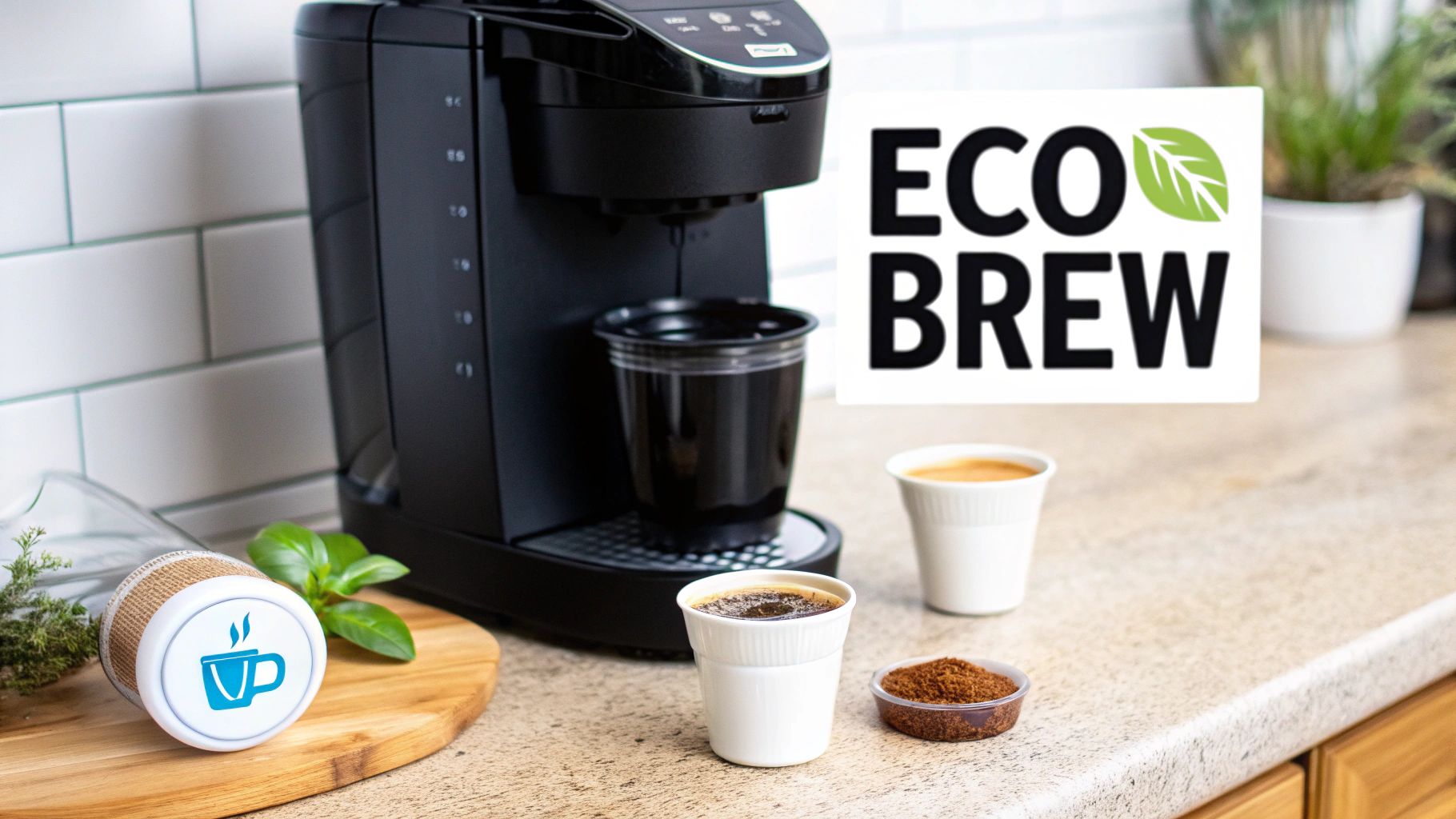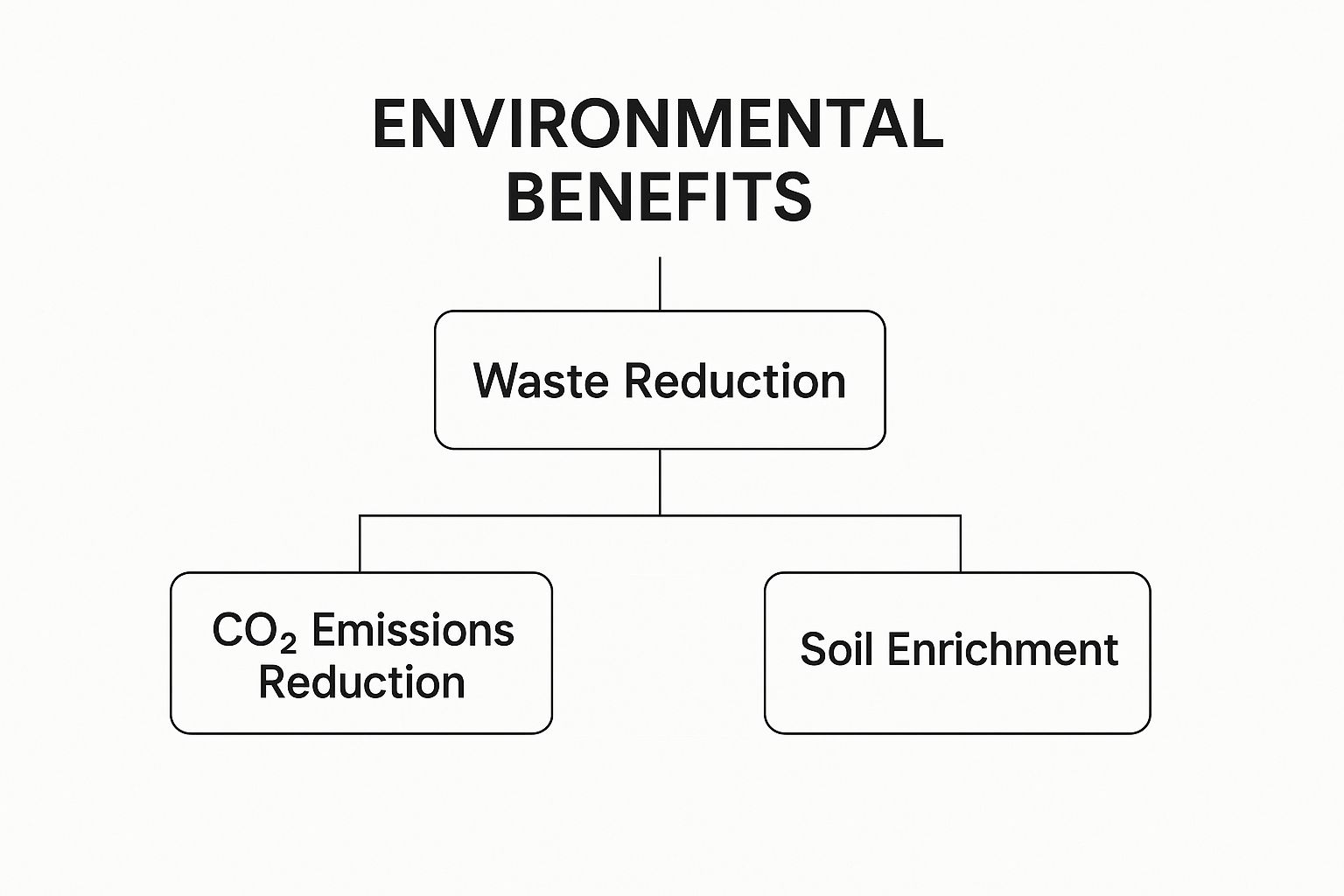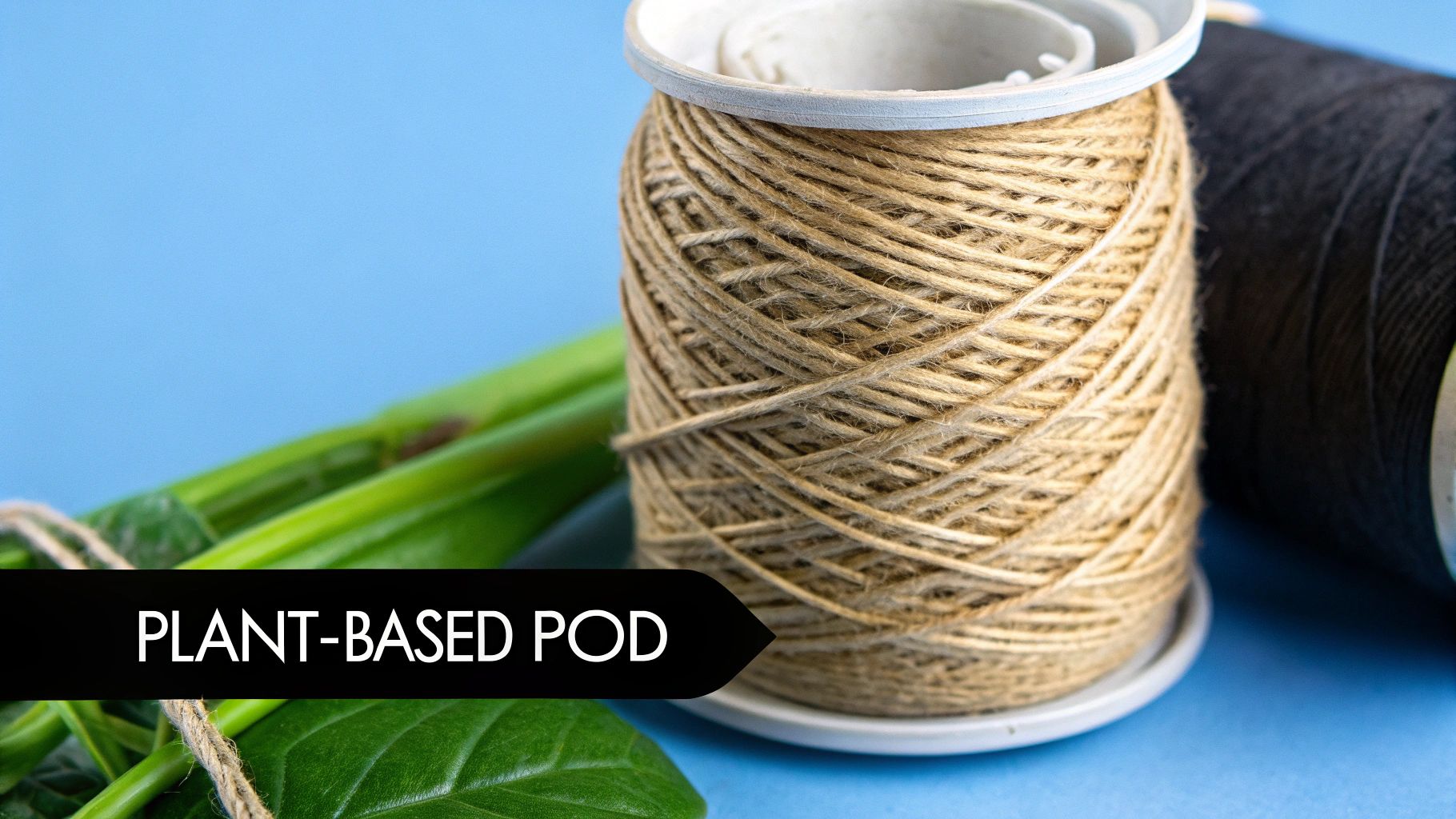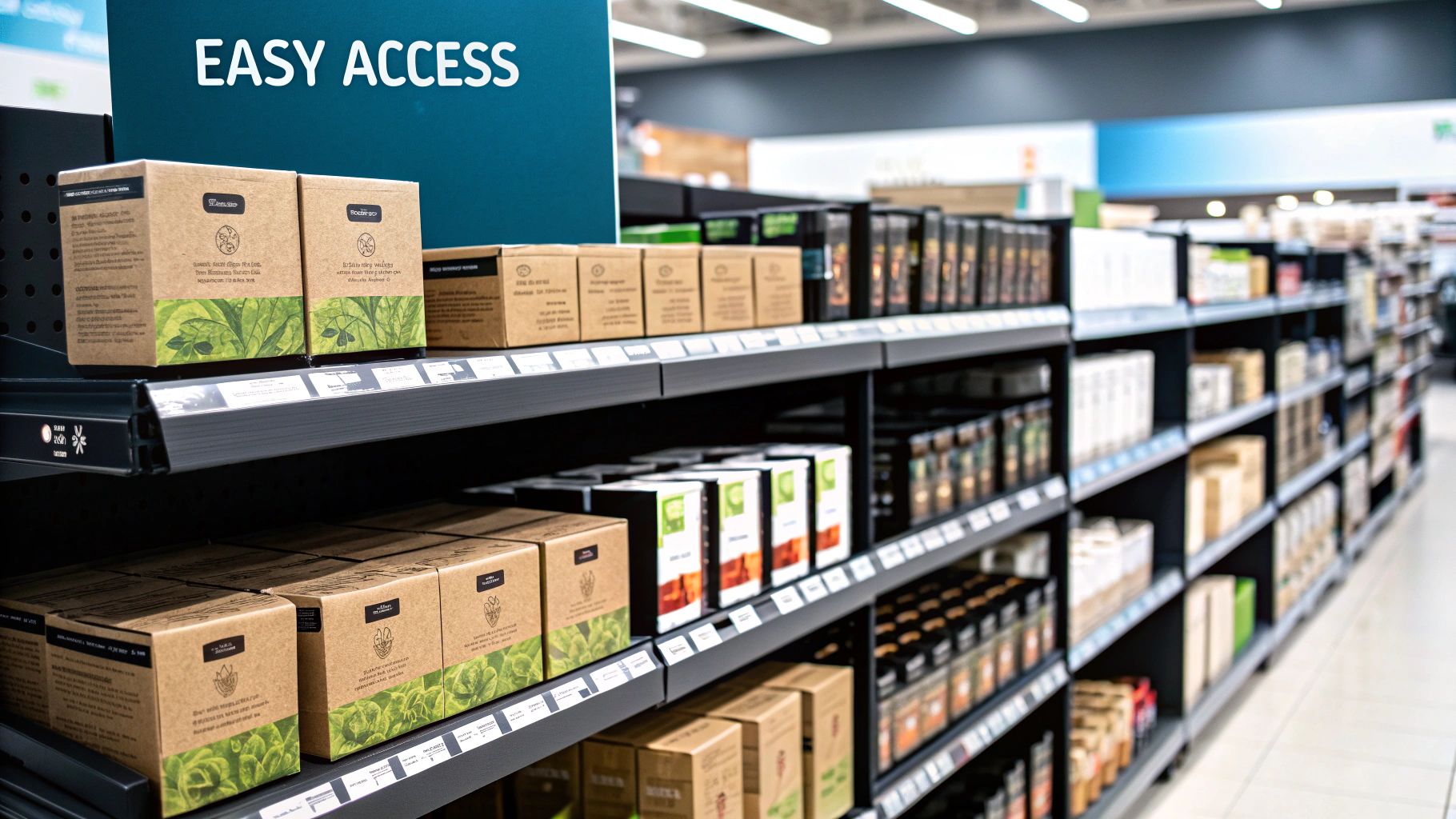
Your Guide to the Best Compostable Coffee Pod
Share
Imagine your daily coffee ritual doing more than just waking you up—what if it was actively helping the planet? This guide is for the UK coffee lover who loves the convenience of pods but is starting to worry about their environmental footprint. I'm here to tell you that switching to a compostable coffee pod isn't a compromise; it’s an upgrade to exceptional speciality coffee with a clear conscience.
Your Morning Coffee Can Be a Force for Good

For millions of us across the UK, the simple act of brewing a morning coffee is a cherished routine. For years, though, the ease of coffee pods has been overshadowed by a massive environmental cost, with billions of plastic and aluminium capsules ending up in landfills. But a positive change is brewing.
This shift is more than just a trend; it's a conscious decision to align our daily habits with our values. By choosing compostable coffee pods, you’re taking part in a circular economy—one where waste isn't the end of the line, but a new beginning.
Your daily choice of coffee pod can either contribute to a growing waste problem or become part of a regenerative solution that enriches our soil. It's a small change with a powerful, lasting impact.
This guide will help cut through the noise and potential greenwashing, giving you a clear path to making a choice you can feel genuinely good about. We’ll show you that convenience and sustainability can, and absolutely should, go hand-in-hand.
The Growing Demand for Greener Coffee in the UK
The desire for more responsible options is completely reshaping the speciality coffee industry. UK consumers are increasingly seeking out brands that put the planet first without sacrificing the quality of the coffee itself. This growing awareness isn't just a niche interest anymore; it's a widespread movement.
And the market trends back this up. The UK coffee pod market is expanding, driven almost entirely by this demand for both convenience and sustainability.
- The market was valued at £708 million in 2025.
- It's projected to grow to £910 million by 2030.
- That’s a steady annual growth rate of 5.12%.
This growth isn't just about selling more pods; it's about selling better ones. The rock-solid preference for eco-friendly options is a clear signal that the future of coffee is sustainable. You can dive deeper into the UK coffee pod market on Knowledge Sourcing Intelligence.
Understanding What Makes a Pod Truly Compostable
To get your head around what makes a coffee pod properly compostable, think of it like an apple core rather than a plastic bottle. Once you’re done with both, you throw them away. But only the apple core is designed by nature to break down completely, returning to the earth and feeding the soil.
That’s the basic idea behind a truly compostable pod. It’s made from materials that are meant to fully decompose under the right conditions, like plant-based plastics derived from corn starch or sugarcane, often called PLA (Polylactic Acid). So, instead of sitting in a landfill for centuries, the whole thing—lid, ring, and coffee grounds—transforms back into nutrient-rich compost.
Biodegradable vs Certified Compostable
In the world of eco-friendly coffee, words matter. You'll often see "biodegradable" and "compostable" used as if they mean the same thing, but for UK consumers, the difference is huge. Getting this right is the key to avoiding 'greenwashing' and making a choice that’s genuinely better for the planet.
It's easy to get lost in the jargon, so let's clear things up.
Decoding Eco-Friendly Pod Terminology
| Term | What It Means in the UK | Breaks Down Into | The Bottom Line |
|---|---|---|---|
| Biodegradable | The item will break down over time, but there's no set timescale. A log is biodegradable, but it takes decades. | Smaller fragments, which could include microplastics if the original item was plastic-based. | It's a vague claim with no guarantee of environmental benefit. Often, it just means it will eventually fall apart. |
| Industrially Compostable | Certified to break down in a high-heat industrial composting facility within a specific timeframe (usually 90-180 days). | Water, carbon dioxide, and biomass (compost). No toxic residue. | Great, but only if you have access to a council food waste collection that accepts them. Not suitable for home composting. |
| Home Compostable | Certified to break down in the cooler, less-controlled conditions of a typical garden compost bin within a set period (usually 6-12 months). | Water, carbon dioxide, and biomass (compost). Safe for your garden soil. | This is the gold standard for at-home convenience. You can compost it yourself, closing the loop in your own back garden. |
As you can see, the terms aren't interchangeable. "Biodegradable" offers very little assurance.
The crucial distinction is why official certifications are so important. For UK coffee lovers, the most reliable seal of approval is the 'TÜV Austria OK compost HOME' certification. Seeing this logo is your guarantee that the pod has been rigorously tested by an independent body and is proven to break down in a standard garden compost heap.
Choosing a pod with a "HOME" compostable certification means you are choosing a product scientifically verified to complete its natural cycle in your own back garden, creating a truly circular system.
And this isn't a niche idea anymore; the shift towards these materials is picking up real speed. Europe, with the UK playing a big part, is leading the way in adopting compostable pods. This is all thanks to people like you demanding more sustainable options and putting pressure on companies to cut down on plastic waste.
You can dig deeper into this trend in the compostable coffee pod market report.
This image sums up the environmental benefits of making the switch perfectly.

It shows how one simple choice can trigger a whole chain of positive effects, from easing the burden on our landfills to actively making our soil healthier.
The Real-World Impact of Choosing Compostable

It’s easy to feel like one small choice can’t really make a difference, but when it comes to your morning coffee, the opposite is true. Every single compostable coffee pod you use is part of a powerful ripple effect, creating tangible, positive change right here in the UK. This isn’t just theory; it's a practical way to combat a national problem.
Think about the journey of a conventional plastic or aluminium pod. After a few moments of use, its final destination is a landfill, where it joins tonnes of other single-use waste. These materials can take up to 500 years to break down, contributing to overflowing sites and polluting our environment for generations.
Your choice to switch actively reroutes this journey.
From Your Kitchen to the Earth
A compostable pod follows a completely different, regenerative path. Instead of becoming a centuries-long problem, it transforms into a valuable resource. It’s a genuine circular solution where nothing is wasted.
This process has two major benefits for every UK resident:
- Diverting Waste from Landfills: Every pod you compost is one less piece of rubbish buried in the ground. Collectively, this action reduces the strain on our waste management systems and lessens the environmental burden on our local communities.
- Revitalising Our Soil: When the pod breaks down, it becomes nutrient-rich compost. This organic matter is vital for improving soil health, helping gardens, allotments, and farms across the country to thrive naturally, without chemical fertilisers.
By choosing a compostable coffee pod, you are not just throwing something away. You are actively participating in a cycle of renewal that enriches the very soil beneath our feet.
A Growing Movement for Change
Your individual action is part of a much larger, inspiring shift. The global market for compostable coffee pods is seeing strong growth, a trend that’s particularly noticeable in the UK thanks to our heightened environmental awareness and new regulations targeting single-use plastics.
This consumer-led move away from traditional plastic and aluminium capsules is being amplified by UK legislation aimed at reducing plastic waste, making compostable alternatives more important than ever. You can learn more about this encouraging shift in the compostable coffee pod market analysis.
Each pod you compost contributes to this collective effort, proving that your daily coffee can be a genuine force for good.
How to Select the Perfect Compostable Pods for the Speciality Coffee Drinker
You’re sold on the idea of compostable pods. Fantastic. But for the speciality coffee enthusiast in the UK, the real challenge is finding pods that deliver exceptional flavour, work with your machine, and align with your values.
Think of this as your pre-purchase checklist. A few simple considerations will ensure you're getting pods that are a perfect match for you. It turns a simple shop into a properly considered choice.
Confirm Your Machine Compatibility
First things first, and this one’s a deal-breaker. The most incredible, ethically sourced coffee is a bit pointless if the pod won’t even work in your machine.
Reputable UK brands are always clear about this, so have a quick look at the product description or the box itself for a list of compatible machines. This little check saves you from brewing disasters and guarantees a smooth, perfect extraction every single time. It’s good for your coffee and good for your machine.
A pod that doesn’t fit properly can give you a weak, watery brew at best. At worst, it could damage your machine. A moment spent checking compatibility will save you a world of frustration later on.
Once you know the pod will fit, you can get to the fun part: the coffee itself.
Prioritise Coffee Quality and Ethics
Let’s be honest, a pod is only as good as the coffee inside it. For anyone who appreciates speciality coffee, this is the most important part. You need to look past the compostable packaging and find out what’s actually going on with the beans. The best UK roasters are always proud to tell you their story.
Here’s what to look for to ensure you’re getting a genuinely premium brew:
- Bean Origin: Do they tell you the country or even the specific farm the beans come from? Single-origin pods are great for tasting unique, distinct flavour profiles.
- Ethical Sourcing: How is the coffee sourced? Look for brands that have direct relationships with their farmers. This nearly always means better quality coffee and, crucially, fairer pay for the people who grow it.
- Roast Profile: Just like with whole beans, the roast level—light, medium, or dark—is going to completely change the taste in your cup. Go for a roaster that offers a profile you know you already love.
When a roaster is transparent about where their coffee comes from and how they roast it, it’s a massive clue that you’re buying real quality, not just clever marketing. It makes sure your sustainable choice is a delicious one, too.
Your Guide to Composting Pods Correctly in the UK

This is where the real magic happens. You’ve chosen your perfect speciality coffee, enjoyed an exceptional brew from a brilliant compostable coffee pod, and now it’s time to complete the cycle. This is the moment you close the loop, turning your used pod from waste into something that genuinely enriches the earth.
Getting the composting part right is the final, crucial step in making a truly sustainable choice. Whether you're a seasoned gardener with a thriving compost heap or you rely on your local council's services, the process is surprisingly straightforward once you know the basics.
Let’s walk through the main routes available right here in the UK, so you can be confident your eco-friendly choice fulfils its promise.
Home Composting: The Gold Standard
If your pods carry the ‘TÜV Austria OK compost HOME’ certification, your garden compost bin is their ideal final destination. This label is a guarantee that the pod is designed to break down in the cooler, less intense conditions of a typical domestic compost heap.
To get it right, just treat your used pods like any other "green" material you'd add, such as vegetable peelings or fresh grass clippings.
- Balance is Key: A healthy compost bin thrives on a good mix of green (nitrogen-rich) and brown (carbon-rich) stuff. Think of your pods and coffee grounds as the green team, and balance them with things like torn-up cardboard, dry leaves, or twigs.
- Aerate Regularly: Give your compost a good turn with a garden fork every few weeks. This gets oxygen flowing, which is vital for the microorganisms doing all the hard work. It really speeds things up.
- Maintain Moisture: Your compost heap should feel damp, a bit like a wrung-out sponge. If it gets too dry, especially in warmer weather, just give it a light watering.
A home compost bin isn’t just a disposal method; it’s a small-scale recycling plant in your own back garden. You're transforming kitchen scraps and coffee pods into a superfood for your soil.
Once your compostable coffee pods have fully broken down into dark, crumbly compost, it becomes an incredible resource for your garden. You can learn more about how organic vegetable fertilizer, including compost, benefits your garden and see how this "black gold" helps your plants flourish.
Using Council Food Waste Collections
What if you don't have a garden? No problem. Many UK households can still compost their pods through their local council's food and garden waste collection service. These services take the waste to industrial composting facilities where high temperatures break everything down incredibly fast.
The only catch is that you have to check first. Not all councils accept compostable packaging in their food waste bins. A quick visit to your local council’s website is all it takes to find out what is and isn't allowed in your area. This simple check prevents contamination and makes sure the whole batch can be processed properly.
UK Disposal Guide for Your Compostable Coffee Pods
Navigating the different certifications and local rules can feel a bit confusing at first. This simple table breaks down the best disposal route for your pods here in the UK.
| Disposal Method | Best for Pods Certified As | Key Success Tip | Always Check With |
|---|---|---|---|
| Home Compost Bin | OK compost HOME | Mix with plenty of 'brown' materials like cardboard and twigs to create a balanced pile. | Your pod's packaging to confirm certification. |
| Council Food Waste | OK compost INDUSTRIAL / HOME | Remove any non-compostable outer packaging before placing the pod in your caddy. | Your local council's website for their specific guidelines. |
| Brand Take-Back Scheme | Any pod from the specific brand | Collect your pods in the provided bag and arrange a collection or drop-off as instructed. | The coffee roaster's website for details on their scheme. |
By choosing the right path, you ensure your used compostable coffee pod completes its journey as intended—enriching UK soil and proving that modern convenience can genuinely serve the planet.
The Future of Coffee is in Your Cup
Making the switch to compostable coffee pods is about so much more than just trying a new brand. It’s a conscious decision to brew better. This one small tweak to your daily routine is a powerful vote for a healthier planet, sending a clear signal to the speciality coffee industry that sustainability is just as important as flavour.
Think of this guide as your starting point. You’re not just swapping products; you’re joining a growing community of UK coffee lovers who are proving that our daily habits can add up to create real, positive change. It's about making a choice that feels good and does good, perfectly aligning your love for exceptional coffee with a commitment to protecting our environment for years to come.
Enjoy every single sip, knowing your coffee is as good for the Earth as it is in your cup. It’s a simple pleasure with a meaningful purpose.
And if you're keen to take things a step further, you can explore these essential zero waste lifestyle tips to make sustainable choices in other parts of your life. Every step, big or small, helps build a better world—and your morning coffee can be a brilliant part of that journey.
Got Questions? We’ve Got Answers.
Making the switch to a greener coffee routine always brings up a few practical questions. It’s a new way of thinking about your daily brew, so it’s completely natural to want to get the details right. We’ve put together some straightforward answers to the most common queries we hear, helping you feel totally confident in your choice.
Will Compostable Coffee Pods Work in My Machine?
This is usually the first thing people ask, and for good reason. The great news is that most compostable pods are designed to be compatible with popular pod systems, especially original-style machines.
That said, it’s always a good idea to double-check the roaster's compatibility list before you buy. Reputable UK brands are very clear about which machines their pods work with to make sure you get a perfect extraction every time, without risking damage to your brewer. A quick look at the product page can save you a lot of hassle.
How Do I Know if a Pod Is Genuinely Home Compostable?
With so much ‘green’ marketing out there, this is a vital question. The simplest way to know for sure is to look for official certification logos right there on the packaging.
In the UK and Europe, the gold standard for third-party certification is 'TÜV Austria OK compost HOME'. This logo is your independent guarantee that the pod has been properly tested and is proven to break down in the conditions of a typical home compost bin. Without it, a pod might need an industrial composting facility to break down properly.
What Happens if I Accidentally Put a Compostable Pod in My Regular Bin?
It happens. If a compostable coffee pod ends up in a landfill, it will probably break down much, much slower than intended. The lack of oxygen in a landfill environment means it could even release methane gas as it decomposes.
While it’s still a better outcome than plastic or aluminium—which will stick around for hundreds of years—the real environmental benefit is only unlocked when it’s composted correctly. That’s why popping it in your home compost or council food waste bin is so important for completing its green journey.
Why Not Just Use Recyclable Aluminium Pods?
While recyclable pods are a definite step up from single-use plastic, the recycling process itself isn't perfect. It takes a huge amount of energy and resources to melt down and reform the aluminium.
On top of that, their small size and the coffee grounds left inside often mean they get rejected by standard recycling facilities unless you send them to a special, brand-specific scheme. Composting is a far more circular solution. It breaks the material down completely and returns valuable nutrients to the soil, creating a healthy, natural loop instead of just another industrial process.
Ready to embrace a truly sustainable and delicious coffee experience? At Ue Coffee Roasters, we've combined our passion for exceptional speciality coffee with our commitment to the planet. Explore our range of home-compostable coffee pods and discover a better way to brew. Find your perfect pod today.
